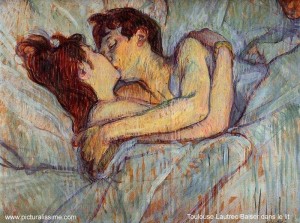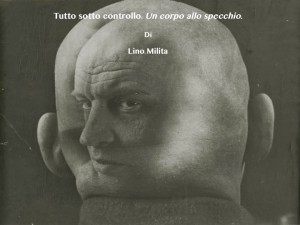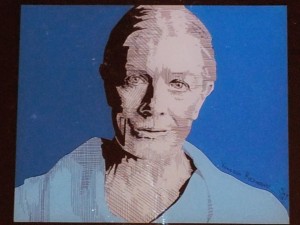March 2, 2014
This picture is one of the few Henri de Toulouse-Lautrec (Albi, November 24, 1864 – Saint-André-du-Bois, September 9, 1901) where the lovers are facing forward each other.
In spite of all lovers maintaining the modesty of the eyes closed. Lautrec‘s paintings, usually, each character looks at himself when dancing, walking, or practice ablutions. Every body is just. This picture is one of the few if not the only, where the two parties are face to face, but her eyes closed. Everyone in the tension of the kiss that begins to connect his lips. The two bodies are not wrapped, but they are in a reciprocal call, as if each of the two, looking and feeling your emotional state, wants to share it with others. It is a kiss that is first and foremost a meeting. It is a discreet encounter: an offer.
The two bodies are held, but did not grasp. The arms are placed on the shoulders to get a perspective of alignment of the two faces and two mouths. The line of the kiss is a relationship that takes the picture. The bed sunk creates depth: it receives a balance of these two bodies lined by row of the kiss which is not cut, but it contains all the subject. The axis reveals a texture that starts from the mouths and with concentric circles, it expands from the shoulders to the hands up to the base of the painting, which implies the continuity of the two bodies, down to the feet. The line and the point constitute the epicenter of a dual relationship to synchronous two feelings of attraction.
The delicate features, despite the folds and turns the balance solitary, are offered by vertical strokes, almost as if we saw them in a dream, or a memory. The bodies do not want to be excessive. They do not scream and do not require attention: they are present and ready to turn out to those who gets up and holds his gaze. They speak to those who are willing to listen to the strokes chromatic and stamp the forms evoked by the framework.
The poem is also this: a chaste kiss and ready to overflow. A greeting that is willing to be a hug panoramic feelings, joys and sorrows, hopes and certainties, melancholy and despair. It contains all without requiring that, even when she stands as irreverent poetry of claim. The discrete sentences have the road open in poetic feeling, because naked, they immediately offer all of the speaker and that it evokes.
Toulouse Lautrec in this context reveals an inner stamp: a personal and intimate desire never fully evoked in his life.



